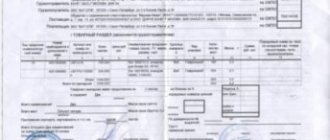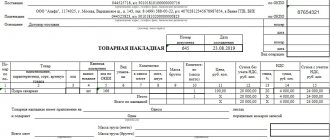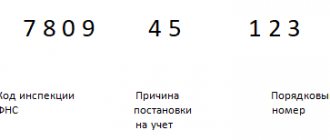| A busy schedule prevents you from attending professional development events? We found a way out! |
Consultation provided on July 20, 2015.
The organization rents an office in Moscow (legal address) and a warehouse in the Moscow region (without forming a separate division), from which customers pick up goods by self-pickup.
In the above circumstances, does the organization have an obligation to indicate the warehouse address in the invoice in the line “Consignor and his address”?
How to correctly fill out the “Supplier” line of the TORG-12 form?
This consultation does not address the issue related to the need to register a separate division.
On this issue we take the following position:
When selling goods through a structural unit in the above circumstances, in line 3 “Consignor and his address” of the invoice, you should indicate “the same person” (without indicating the warehouse address).
Justification for the position:
What shortcomings in the invoice can lead to additional taxes, and what not (Vightman E.)
The Ministry of Finance called the details “primary”, in which it is better not to make mistakes. The details “Consignor and his address” are optional. Errors in the delivery note can be corrected. The consignment note (previously compiled according to the unified form N TORG-12) is important both for recognizing in tax accounting expenses for the purchase of assets and for deducting VAT (paragraph 2, paragraph 1, article 172 and paragraph 4, paragraph 1, article 252 Tax Code of the Russian Federation). After all, it confirms the transfer of ownership of the acquired property. If the invoice is drawn up with errors, tax authorities often deny the buyer the deduction of VAT and accounting for expenses. We will analyze judicial practice, explanations from the Russian Ministry of Finance and tax authorities in order to identify dangerous details. Let us formulate arguments that will help organizations resist unfounded claims. The controllers agree that minor errors in invoices do not prevent the accounting of expenses and the deduction of VAT. The Russian Ministry of Finance has clarified which errors in primary documents are not grounds for refusing to recognize expenses. These include shortcomings that do not prevent tax authorities from identifying the seller, buyer, name of goods, work or services and their cost during the audit (Letter dated 02/04/2015 N 03-03-10/4547). The Federal Tax Service of Russia supported this approach (Letter dated 02/12/2015 N ГД-4-3/ [email protected] ). This means that the most dangerous errors are in the following details of the consignment note (the names of the details are given in accordance with the unified form N TORG-12, approved by Resolution of the State Statistics Committee of Russia dated December 25, 1998 N 132): - supplier, his address, telephone, fax, bank details; — payer, his address, telephone, fax, bank details; — name, characteristics, grade, article number of the product (column 2 of the tabular part); — amount including VAT (column 15 of the tabular section). The absence of bank details of the supplier or buyer in the invoice does not refute the fact of purchase of the goods. The capital's tax authorities confirmed that this deficiency does not affect the recognition of expenses and the deduction of VAT (Letter of the Federal Tax Service of Russia for Moscow dated April 26, 2010 N 16-15/43834). If an organization uses an independently developed form of a consignment note, it is important that it contains all the details required for the “primary” (Clause 2, Article 9 of the Federal Law of December 6, 2011 N 402-FZ “On Accounting”, hereinafter referred to as the Law on accounting): - name and date of preparation of the document; — name of the organization or full name. the entrepreneur on whose behalf the document was drawn up; - content of the fact of economic life; - unit of measurement; — job title, surname, initials and signatures of the persons responsible for processing the transaction (read more in the box below). Note! It is risky to endorse an invoice with a facsimile signature. Tax officials say that primary documents cannot be signed using a facsimile. After all, they must bear the personal signature of the responsible person (Letters of the Federal Tax Service of Russia dated September 23, 2008 N 3-1-11 / [email protected] and the Federal Tax Service of Russia for Moscow dated January 25, 2008 N 20-12/05968). But the legislation has changed. The requirement to affix a personal signature was specified in the Federal Law of November 21, 1996 N 129-FZ “On Accounting”. This document has lost force since January 1, 2013. Now the list of mandatory details of the “primary registration” simply mentions a signature (clause 7, clause 2, article 9 of the Accounting Law). Despite this, judicial practice remains ambiguous. Many courts are still against signing the “primary document” with facsimile signatures. In their opinion, documents certified by facsimile are invalid. That is, with the help of such papers it is impossible to confirm any facts of economic activity. Including the fact of purchase of goods (Resolutions of the Far Eastern Federal Antimonopoly Service dated April 2, 2014 N F03-1016/2014, Volga District dated April 1, 2014 N A57-4665/2013 and Central District dated March 28, 2013 N A68-2818/12). Of course, the organization has the right to refer to changes in accounting legislation. But this does not guarantee her victory in the argument. Therefore, it is safer not to endorse invoices and other “primary documents” with facsimile signatures. Even if this option for signing documents is provided for in the agreement with the counterparty (clause 2 of Article 160 of the Civil Code of the Russian Federation). Failure to complete or absence of other details in the invoice is not so important. For example, the company itself decides whether or not to fill out the line “Shipping organization, address, telephone, fax, bank details.” Tax officials consider this detail of the delivery note to be optional (Letter of the Federal Tax Service of Russia dated November 25, 2014 N ED-4-15/ [email protected] ). This means that errors in it should not lead to refusal to account for expenses and deduct “input” VAT. Note. The absence of secondary details in the invoice does not refute the fact of purchase of the goods. If there is other evidence that the transaction is fictitious, errors in the delivery note will only confirm suspicions. The courts believe that the presence of errors in the delivery note does not refute the delivery of goods and their acceptance for accounting. Defects only indicate a violation of accounting rules. This means that the tax authorities’ reference only to these defects cannot be the basis for excluding the buyer’s expenses and refusing to deduct VAT (Resolutions of the Moscow Federal Antimonopoly Service dated February 26, 2014 N F05-576/2014, West Siberian Federal Antimonopoly Service dated March 1, 2012 N A75-1969/2011 , Ural dated June 30, 2011 N F09-3562/11, East Siberian dated December 20, 2007 N A19-7415/07-33-F02-9351/07 and dated December 14, 2007 N A19-8418/07-57-F02- 9192/07 districts). But if there is other evidence of the unreality of the transaction, the court can support the inspectors (Resolutions of the Federal Antimonopoly Service of the North Caucasus dated September 20, 2013 N A53-24630/2012, the Ural Federal Antimonopoly Service dated February 17, 2012 N F09-99/12 and the West Siberian Federal Antimonopoly Service dated November 6, 2009 N A27- 1367/2009 districts). What claims to the registration of invoices are successfully challenged by organizations in the courts? The date of shipment or acceptance of the goods is not indicated. According to tax authorities, the absence of this information in the invoice is evidence that the buyer did not receive the goods. This means that he does not have the right to include the cost of goods in tax expenses and deduct “input” VAT (paragraph 2, paragraph 1, article 172 and paragraph 4, paragraph 1, article 252 of the Tax Code of the Russian Federation). But the date of shipment of the goods by the supplier and the date of its receipt by the buyer are not mandatory details. These include only the date of preparation of the invoice itself (clause 2, clause 2, article 9 of the Accounting Law). Therefore, the courts believe that the absence of delivery and acceptance dates of goods in invoices does not prevent the accounting of expenses and the deduction of VAT (Determination of the Supreme Arbitration Court of the Russian Federation dated December 17, 2009 N VAS-16581/09, Resolution of the Arbitration Court of the North-Western District dated May 22, 2015 N F07-2297 /2015, FAS Moscow District dated 08/12/2011 N KA-A40/8591-11 and dated 03/12/2010 N KA-A41/1727-10). There are no details of the power of attorney of the person who signed the invoice. This defect also does not refute the fact of delivery and receipt of goods. Especially if the other details of the delivery note are filled out flawlessly. The main thing is that the person who signed the invoice has the authority to do so. Therefore, a copy of the power of attorney must be attached to the invoice. This will help deny claims. Moreover, the parties to the transaction have the right to make corrections to the invoice (Clause 7, Article 9 of the Accounting Law). That is, enter the details of the power of attorney into it. Since the invoice is prepared by the seller, he must make changes to it. Corrections must be certified by the signatures of those persons who prepared the invoice, and their surnames and initials must be indicated. You also need to put a date for making changes. Most courts allow the buyer to take into account expenses and accept VAT for deduction, even if the invoice does not contain a reference to the details of the power of attorney (Resolution of the Arbitration Court of the West Siberian dated 09.18.2014 N A03-24469/2013, FAS West Siberian dated 01.03.2012 N A75- 1969/2011, Moscow dated 02/29/2012 N A40-127306/10-90-714 and Volga region dated 05/22/2007 N A12-16921/06 districts). The arbitrators consider this defect to be minor. But only in the absence of other signs that the transaction is fictitious. The position or transcript of the signature of the person who signed the invoice is not indicated. Both of these details of the invoice are mandatory (clauses 6 and 7, clause 2, article 9 of the Accounting Law). This is what tax authorities usually refer to when deducting expenses and refusing to deduct VAT. But the courts reason differently. In their opinion, the absence of a position name and a transcript of the signature in the invoice is a minor drawback. It indicates, first of all, a violation of accounting rules. Moreover, this violation was committed by the seller. The buyer should not be responsible for the mistakes of counterparties (Definition of the Constitutional Court of the Russian Federation of October 16, 2003 N 329-O). If the facts of shipment and acceptance of goods are confirmed, the buyer has the right to take into account their value in tax accounting and accept “input” VAT for deduction even in the absence of a decryption of the signature (Resolutions of the Federal Antimonopoly Service of Povolzhsky dated May 22, 2012 N A55-5626/2010 and dated May 22, 2007 N A12 -16921/06, East Siberian from 09/22/2011 N A58-6676/2010 and Moscow from 09/14/2011 N A40-123143/10-116-503 districts). In addition to invoices, the fact of receipt of goods can be confirmed by contracts, waybills, reconciliation reports with suppliers, warehouse accounting documents, printouts of accounting account cards indicating the posting of goods and materials (for example, accounts 10 or 41). Another argument is that the absence of a transcript of the signature of the person who signed the delivery note does not prevent the identification of the supplier, buyer, name of the product, its quantity and date of release. This means that this deficiency does not lead to negative tax consequences. This is noted by some courts (Resolutions of the Federal Antimonopoly Service of the Central District dated 05/31/2011 N A35-9286/2010 and the Northwestern District dated 05/04/2011 N A13-7011/2010). Note. Courts consider many shortcomings in the preparation of invoices to be insignificant. The Russian Ministry of Finance agrees that shortcomings in the “primary”, which do not create obstacles to identifying the essential aspects of the transaction, do not entail a refusal to account for expenses (Letter dated 02/04/2015 N 03-03-10/4547). It is advisable to refer to this when disagreements arise. There is no link to the bill of lading If goods are delivered to the buyer by a third-party carrier, the supplier indicates the details of the bill of lading in the bill of lading - its number and date. Tax authorities consider the absence of this information to be a serious violation. In their opinion, this casts doubt on the reality of transporting goods. Therefore, inspectors refuse to allow the buyer to account for expenses and deduct “input” VAT. The courts note that a reference to the waybill is not a mandatory detail of the invoice. Even without this link, you can reliably establish who received what product, when and what. Lack of information about the waybill does not prevent the goods from being posted. After all, the organization accepts goods for accounting on the basis of the consignment note. There is enough data in it for this. Therefore, the courts do not see any obstacles to recognizing expenses and deducting VAT on goods, the shipment of which was registered with such a minor defect (Resolutions of the Federal Antimonopoly Service of the North-West of September 26, 2013 N A13-9242/2012 and of November 8, 2011 N A13-12880/2010, Central dated December 22, 2010 N A68-11668/09, East Siberian district dated June 24, 2008 NN A19-15326/07-57-F02-2709/08 and A19-15325/07-24-F02-2707/08 districts). The gross weight of the cargo is not indicated. In addition to the quantity of goods, the bill of lading contains a column for indicating the gross weight. That is, the weight of the goods together with containers and packaging (column 9 of the tabular part). Failure to fill out this detail, together with other shortcomings, is recognized by tax authorities as a violation, which entails a refusal to deduct VAT and account for expenses. Many organizations simply do not need information about gross weight. Especially if they accept goods for accounting individually. The courts take this circumstance into account and reject the claims of the inspectors (Resolutions of the FAS North Caucasus dated October 26, 2009 N A53-27009/2008-C5-34, Moscow dated August 21, 2008 N KA-A40/7847-08, East Siberian dated March 18, 2008 N A33-6296/07-F02-967/08 and dated 03/06/2008 N A19-11334/07-51-F02-737/08 districts). Even if the goods are by weight, the absence of data on the gross weight in the invoice does not refute the fact of purchase of the goods. This information is not required to be filled out. Therefore, the courts allow buyers to recognize the costs of purchasing weighted goods and accept the “input” VAT on them for deduction (Resolutions of the FAS Povolzhsky dated 05.05.2011 N A49-5601/2010, Uralsky dated 04.28.2011 N F09-1468/11-C2, Moscow dated 02/16/2009 N KA-A40/374-09 and West Siberian district dated 09/11/2007 N F04-6170/2007(37886-A03-29) districts).
Which tax identification number and checkpoint to indicate in TORG-12 when working with a separate division
Company GARANT
In accordance with the terms of the supply agreement, goods are shipped to the buyer on a self-pickup basis, that is, the goods are transferred to the buyer at the organization's warehouse and their further transportation is carried out by the buyer himself. The supply agreement specifies the buyer’s details, including the address, tax identification number and checkpoint of the parent organization. But the buyer received a letter with an order to fill out TORG-12 and invoices indicating the checkpoint and the address (in the “Consignee” line) of a separate division - a warehouse where the buyer himself will transport the purchased goods. Is the buyer's request legal?
Having considered the issue, we came to the following conclusion:
Considering the presence of a letter from the buyer specifying his details, in the invoice issued upon shipment of goods, your organization should indicate the checkpoint of the buyer’s separate division (warehouse). There is no need to indicate the INN and KPP of the buyer (consignee and payer) in the waybills in the TORG-12 form.
Additionally, we recommend that, in order to insure the buyer against possible claims from the tax authorities, in the case under consideration, in the line “Consignee and his address” of the invoice, reflect both addresses: the actual address of the separate division and the legal address of the buyer.
Considering the presence of a letter from the buyer clarifying his details, we believe that in the corresponding lines of the TORG-12 form the seller should indicate the address of the buyer’s separate division (address of its warehouse).
Please note that, in the opinion of the tax service, the consignee's address indicated in the invoice must match the address indicated in the delivery note of the TORG-12 form.
Rationale for the conclusion:
Civil relations
Within the meaning of Art. 431 of the Civil Code of the Russian Federation, a letter sent to you indicating in invoices and delivery notes the details of a separate division (checkpoint and address of the buyer’s warehouse) can be considered as a document clarifying the buyer’s details under the contract for the supply of goods, especially since these clarifications do not change the essential conditions supply agreement.
Thus, we can conclude that the goods are purchased by the buyer through its own separate division.
Rules for filling out the TORG-12 form
According to paragraphs. 1 and 2 tbsp. 9 of the Federal Law of November 21, 1996 N 129-FZ “On Accounting” (hereinafter referred to as Law N 129-FZ), all business transactions carried out by an organization must be documented with supporting documents. These documents serve as primary accounting documents on the basis of which accounting is conducted.
Primary accounting documents are accepted for accounting if they are drawn up in the form contained in the albums of unified forms of primary accounting documentation, and documents whose form is not provided for in these albums must contain a list of mandatory details.
At the same time, the data of primary documents drawn up when carrying out business transactions, including on persons carrying out operations for sending and receiving cargo, must correspond to the actual circumstances (Resolution of the Presidium of the Supreme Arbitration Court of the Russian Federation dated October 18, 2005 N 4047/05). Therefore, in the TORG-12 form (approved by Decree of the State Statistics Committee of Russia dated December 25, 1998 N 132), compiled for the sale (release) of inventory items, the actual consignees and payers should be indicated.
Since the buyer picks up the goods independently and your organization does not ship them to third parties specified by the buyer, the consignee of the goods in this case is the buyer.
The TORG-12 form does not specify the address of the consignee and the payer, so it may indicate both the legal and actual address of the buyer (warehouse address). In our opinion, when filling out these details, you should be guided by the details of the parties specified in the supply agreement.
However, taking into account the presence of a letter from the buyer clarifying his details, we believe that the seller should indicate in the appropriate lines of the TORG-12 form the address of the buyer’s separate division (address of its warehouse).
Please note that in the unified form of consignment note TORG-12 in the lines “Consignee” and “Payer” the following must be indicated: organization, address, telephone, fax and bank details. The TORG-12 form does not contain a requirement to indicate the TIN and KPP in these lines.
Rules for filling out invoices
Clause 2 of Art. 169 of the Tax Code of the Russian Federation establishes that the invoice must meet the requirements established by paragraphs. 5, 5.1 and 6 art. 169 of the Tax Code of the Russian Federation.
The latest amendments to these paragraphs were made to paragraph 4 of Art. 2 of Federal Law No. 229-FZ of July 27, 2010 (hereinafter referred to as Law No. 229-FZ). However, the same law established that until the Government of the Russian Federation approves a new form of invoice, the preparation and issuance of invoices is carried out taking into account the requirements established before the entry into force of Law N 229-FZ (clause 4 of Article 10 of Law N 229-FZ ).
Therefore, at present, when filling out invoices, you should be guided by the Rules for maintaining logs of received and issued invoices, purchase books and sales books when calculating value added tax, approved by Decree of the Government of the Russian Federation dated December 2, 2000 N 914 (hereinafter referred to as the Rules) (see also letter of the Ministry of Finance of Russia dated October 12, 2010 N 03-07-09/46).
checkpoint
The Tax Code of the Russian Federation requires that the TIN of the seller and the buyer be indicated in invoices (clauses 5 and 5.1 of Article 169 of the Tax Code of the Russian Federation). The Rules also contain a requirement to indicate the checkpoint.
As the Ministry of Finance of Russia and the tax service explain, when purchasing goods (work, services) by divisions of an organization, line 6b “TIN/KPP of the buyer” indicates the KPP of the corresponding division (see letters of the Ministry of Finance of Russia dated January 14, 2010 N 03-07-09/01, Federal Tax Service Russia in Moscow dated March 20, 2008 N 19-11/026593).
Considering the presence of a letter from the buyer specifying his details, in the invoice issued upon shipment of goods, your organization should indicate the checkpoint of the buyer’s separate division (warehouse).
Consignee's address
The rules require that invoices indicate the full or abbreviated name of the consignee in accordance with the constituent documents and his postal address. Since it does not specify what should be understood by postal address, then on the basis of clause 1 of Art. 11 of the Tax Code of the Russian Federation, institutions, concepts and terms of civil, family and other branches of legislation of the Russian Federation, used in the Tax Code of the Russian Federation, are applied in the meaning in which they are used in these branches of legislation, unless otherwise provided by the Tax Code of the Russian Federation.
According to clause 2 of the Rules for the provision of postal services, approved by Decree of the Government of the Russian Federation of April 15, 2005 N 221, the postal address is the location of the user indicating the postal code of the corresponding postal facility.
In a letter dated 08/10/2005 N 03-04-11/202, the Ministry of Finance of Russia indicated that when filling out the indicator on line 4 “Consignee and his address” of the invoice, the address of the structural unit of the organization (warehouse) where the cargo needs to be delivered is indicated. In this case, the consignee should be understood as an organization (its structural unit) or an individual entrepreneur, at whose warehouse the actual acceptance of goods is carried out, regardless of the type of transport on which these goods are transported (see also letters of the Ministry of Finance of Russia dated November 9, 2006 N 03-04- 09/18).
That is, it turns out that if the recipient is a structural unit, then its postal address must be indicated. A similar opinion is expressed in the letter of the Federal Tax Service of Russia for Moscow dated April 24, 2007 No. 19-11/37426.
And in a letter dated March 20, 2008 N 19-11/026593, the Federal Tax Service of Russia in Moscow additionally informs that when purchasing materials that are sent to construction sites of separate divisions, in line 4 “Consignee and his address” the “full or abbreviated name the consignee in accordance with the constituent documents and his postal address. In this case, the indication of the name of the consignee must comply with the terms of the contract for the supply of goods.”
That is, if the contract specifies the parent organization as the consignee, the name of the parent organization and its address are entered in the line. If, according to the terms of the contract, the recipient of the cargo is a structural unit, its name and postal address are indicated in the line, that is, the address of the unit where the cargo is delivered.
Thus, the name of the consignee in invoices must comply with the terms of the contract for the supply of goods.
In the resolution of the Federal Antimonopoly Service of the Ural District dated May 2, 2007 N F09-3164/07-S2, the court indicated that Art. 169 of the Tax Code of the Russian Federation does not contain a condition on the need to indicate in the column “Consignee and his address” of the invoice the address of the parent organization when receiving the goods by its separate division.
However, one can notice a gradual change in the position of the Russian Ministry of Finance.
So, if in the letter dated December 14, 2007 N 03-01-15/16-453, the financial authority was of the opinion that line 4 “Consignee and his address” indicates the address of the buyer in accordance with his constituent documents only if the buyer and the consignee are the same person and the address at the location of the buyer indicated in the constituent documents coincides with the postal address.
Then, in a letter dated 08/26/2008 N 03-07-09/24, the Russian Ministry of Finance changed its position, indicating in relation to the shipper that the invoice must indicate the postal address contained in the organization’s constituent documents. At the same time, the financial authority added that, if desired, it is possible to additionally reflect the postal address of the warehouse owned by the consignor (read: consignee) by right of ownership or lease and from which (read: to which) the goods were shipped (read: received), and this will not be a basis for recognizing the invoice as drawn up in violation of the established procedure.
Arbitration practice indicates the presence of claims from tax authorities, as in cases of indicating the taxpayer's address contained in the constituent documents (see resolutions of the FAS of the East Siberian District dated November 25, 2008 N A33-808/2008, dated July 10, 2008 N A19-12735/07 -51, FAS North-Western District dated 02.12.2007 N A56-36691/2006), and in cases where the address of a structural unit is indicated (resolution of the FAS North Caucasus District dated 09.16.2008 N F08-5552/2008, FAS Moscow District dated 05/07/2007 N KA-A41/3396-07).
At the same time, the courts support taxpayers in all cases.
Therefore, in order to insure the buyer against possible claims from the tax authorities, we recommend reflecting two addresses in the line “Consignor and his address”: the actual address of a separate division and the legal address of the organization.
We would also like to draw your attention to the fact that, according to the tax service, the invoice is drawn up on the basis of the primary accounting document - the TORG-12 consignment note. Therefore, when filling out line 4 of the invoice regarding the consignee, you should indicate the data reflected about this person in the corresponding lines of the TORG-12 consignment note (see, for example, letter of the Federal Tax Service of Russia dated January 21, 2010 N 3-1-11/22).
For your information:
Tax liability for incorrect completion of invoices is not provided for for a taxpayer who is a seller of goods under the Tax Code of the Russian Federation.
Regarding the deduction of VAT from the buyer, we note the following. Errors in invoices that do not prevent tax authorities from identifying the seller, buyer of goods (work, services), property rights, the name of goods (work, services), property rights, their value, as well as the tax rate and tax amount when conducting a tax audit, presented to the buyer are not grounds for refusal to accept tax amounts for deduction (second paragraph of clause 2 of Article 169 of the Tax Code of the Russian Federation).
Therefore, even if the invoices indicate an “incorrect”, from the point of view of the tax authority, checkpoint or address of the consignee, we believe that the tax authority has no grounds for refusing to deduct VAT.
The answer was prepared by: Expert of the Legal Consulting Service GARANT auditor, tax service advisor, rank II Varlamova Victoria
Quality control of the response: Reviewer of the Legal Consulting Service GARANT professional accountant Rodyushkin Sergey
Packing list
The Civil Code of the Russian Federation connects the moment of emergence of ownership rights of the acquirer under an agreement with the moment of its transfer, unless otherwise provided by law or agreement (Article 223 of the Civil Code of the Russian Federation).
A delivery note is a supporting document confirming the transfer of ownership of the purchased (sold) goods (unless otherwise established by the purchase (sale) supply agreement) and the buyer’s expenses in the form of the purchase (sale) cost of goods sold (see letter from the Federal Tax Service of Russia for Moscow N 20-12/61786b).
Please note that from 01/01/2013, the forms of primary accounting documents contained in the albums of unified forms of primary accounting documentation are not mandatory for use (see information from the Ministry of Finance of Russia dated 12/04/2012 N PZ-10/2012). At the same time, we believe that the organization has the right to continue to use unified forms of primary accounting documents, including a consignment note in form N TORG-12 (hereinafter referred to as the consignment note), approved by Resolution of the State Statistics Committee of the Russian Federation dated December 25, 1998 N 132, if it will make such a decision. The used forms of primary accounting documents are subject to approval in the accounting policies of the organization for accounting purposes (clause 4 of PBU 1/2008 “Accounting policies of organizations”).
Thus, in the unified form TORG-12, lines are provided to reflect information, in particular, about the supplier and the shipper.
At the same time, not a single regulatory document explains the procedure for filling out individual details of TORG-12. The Ministry of Finance of Russia in letter dated November 13, 2008 N 03-07-09/38 on the issue of filling out information about the shipper in the consignment note in form N TORG-12 sent for clarification to the Federal State Statistics Service.
Later, the Ministry of Finance of Russia, in a letter dated September 15, 2014 N 03-07-РЗ/46026, explained that the data of primary documents drawn up when carrying out business transactions, including on persons carrying out operations for sending and receiving cargo, must correspond to the actual circumstances. This clarification repeats the conclusion made earlier by the Presidium of the Supreme Arbitration Court of the Russian Federation (Resolution of the Presidium of the Supreme Arbitration Court of the Russian Federation dated October 18, 2005 N 4047/05).
Therefore, when filling out the details of the TORG-12 delivery note, you should be guided by the terms of the concluded supply agreement. So, as a supplier in TORG-12 you should indicate the details of the selling organization, that is, your organization.
The shipper can be the owner (proprietor) of the cargo or a person who has a warehouse and acts as a shipper on behalf of the owner of the goods, or a person acting on his own behalf, but at the expense and on behalf of the owner of the goods. This position is expressed by representatives of tax authorities (see, for example, letters from the Federal Tax Service of Russia for Moscow dated December 30, 2009 N 16-15/139277, dated January 16, 2009 N 19-11/002251). It is also supported by the judicial authorities (see decisions of the Federal Antimonopoly Service of the Ural District dated 08.24.2009 N F09-5997/09-S2, the Seventeenth Arbitration Court of Appeal dated 05.08.2009 N 17AP-3007/09).
Since the structural unit is not a legal entity (clauses 1, 2 of Article 48 of the Civil Code of the Russian Federation), it cannot be indicated as a shipper in the consignment note. Therefore, in the above circumstances, the supplier organization should be indicated as the shipper.
Before transfer to the buyer, the owner of the goods is the supplier, therefore, in general, this organization is indicated as the shipper if the shipment is made from its warehouse.
In this situation, the buyer actually receives the goods at the supplier’s warehouse. Thus, the transfer of ownership of the goods occurs at the location of the goods and the supplier’s obligations under the supply agreement are considered fulfilled there.
Note that in the unified form TORG-12 the line “Structural unit” is provided.
In this case, the address of the structural unit (warehouse) can be indicated in the invoice as additional information to the line “Structural unit”.
Thus, in accordance with the Procedure for the use of unified forms of primary accounting documentation, approved by Resolution of the State Statistics Committee of Russia dated March 24, 1999 N 20, in the unified forms of primary accounting documentation (except for forms for recording cash transactions), approved by the State Statistics Committee of Russia, the organization, if necessary, can enter additional details .
If an organization does not indicate the warehouse address in the delivery note in the TORG-12 form in the line “Structural unit,” then this circumstance, in our opinion, cannot lead to serious tax consequences for the supplier organization and the buyer. This, for example, follows from the resolution of the Federal Antimonopoly Service of the Central District dated April 22, 2010 N A35-6356/2009, which considered the situation when an organization indicated the place of its state registration (location), despite the fact that the goods were actually shipped to a different address .
Is it necessary to indicate the Taxpayer Identification Number (TIN) and KPP on the delivery note?
Answer: With regard to the design of the consignment note, the Instructions for the use and completion of forms of primary accounting documentation for recording trade operations, approved by Decree of the State Statistics Committee of the Russian Federation dated December 25, 1998 N 132, contain missing information on filling out the TORG-12 form. At the same time, the current legislation of the Russian Federation allows changes to be made to primary documents (this is information recorded on a tangible medium in the form of text, sound recording or image with details that allow it to be identified. In the narrow sense, a document is expressed in writing), in particular, in accordance with clause 5 Article 9 of the Federal Law of November 21, 1996 N 129-FZ “On Accounting”, corrections can be made to primary accounting documents (not counting cash and banking) by agreement with the participants in business transactions, which must be proven by the signatures of the same persons who signed the documents , indicating the date the corrections were made.
Attention should be drawn to the fact that corrections are made only by persons who originally signed the given document and only in agreement with another counterparty.
Is it necessary to indicate the Taxpayer Identification Number (TIN) and KPP on the delivery note?
- English
- Finland
8 (800) 500-24-74
We are always in touch on WhatsApp +7
- Press center
- Expert opinions
- Is it necessary to indicate the Taxpayer Identification Number (TIN) and KPP on the delivery note?
18.12.2008
Question: Is it necessary to indicate the INN and KPP in the delivery note? If yes, then on the basis of what document and how can you “force” suppliers to change all documents from the beginning of the year if they have not provided the Taxpayer Identification Number and Checkpoint for 7 months. Is it also necessary to issue a consignment note and what details are required in it?
Answer: With regard to the preparation of a consignment note, the Instructions for the use and completion of forms of primary accounting documentation for recording trade operations, approved by Resolution of the State Statistics Committee of the Russian Federation dated December 25, 1998 N 132, contain insufficient information on filling out the TORG-12 form.
It should be noted that the organization’s demands for replacing primary documents are unlawful. The supplier does not have the right to issue new documents, since according to the opinion of the Ministry of Finance of Russia, expressed in letter dated December 8, 2004 N 03-04-11/217, organizations do not have the right to issue new invoices with the same numbers and dates in place of previously issued old invoices. In our opinion, this provision also applies to invoices.
At the same time, the current legislation of the Russian Federation allows changes to be made to primary documents, in particular, in accordance with clause 5 of Article 9 of the Federal Law of November 21, 1996 N 129-FZ “On Accounting”, corrections can be made to primary accounting documents (except for cash and banking documents) be introduced in agreement with the participants in business transactions, which must be confirmed by the signatures of the same persons who signed the documents, indicating the date of the corrections.
Please note that corrections are made only by the persons who originally signed this document and only in agreement with the other counterparty.
At the same time, the consignment note, the form of which was approved by Decree of the State Statistics Committee of the Russian Federation dated November 28, 1997 N 78 “On approval of unified forms of primary accounting documentation for recording the work of construction machinery and mechanisms, work in road transport” (Form N 1-T), is the main transportation document intended to record the movement of inventory items and payments for their transportation by road.
At the same time, the obligation to draw up a customs form arises for the shipper only if goods are transported by a motor transport organization under a contract for the carriage of goods (Section 2 of the Instructions for the use and completion of forms approved by Resolution of the State Statistics Committee of the Russian Federation dated November 28, 1997 N 78, clause 2 of Article 785 Civil Code of the Russian Federation, clause 47 of the Charter of Road Transport of the RSFSR, approved by Resolution of the Council of Ministers of the RSFSR 01/08/69 N 12).
Thus, if the delivery of goods is carried out by the supplier’s or buyer’s transport (in case of self-pickup) without the involvement of a motor transport organization, drawing up a consignment note is not required. In this case, it is enough to use a consignment note, the form of which is approved by Decree of the State Statistics Committee of the Russian Federation dated December 25, 1998 N 132 (Form N TORG-12).
A similar point of view was expressed by arbitration courts (see, for example, resolution of the FAS North-Western District dated September 14, 2005 N A26-1530/2005-217, resolution of the FAS North-Western District dated December 28, 2006 in case No. A13-16213/2005 -19, resolution of the Federal Antimonopoly Service of the North-Western District dated December 26, 2007 in case No. A05-3299/2007).
Dubinyanskaya E.N. Head of the Audit and Finance Department of JSC "United Consulting Group"
Answers to questions are posted in the Legal Reference System "Code" 12/18/2008
Return to list
Office in St. Petersburg: Komsomol str., 41, BC “Finlyandsky” Tel./fax: +7 (812) 325-48-60 E-mail vCard
© 2010–2021 United Consulting Group User Agreement Privacy Policy






